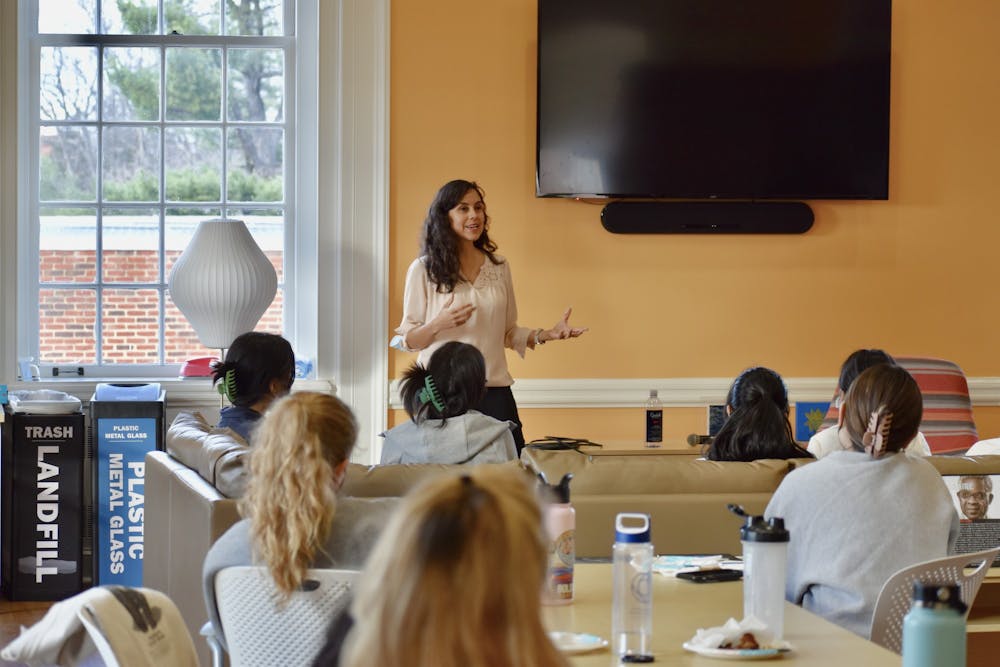Laura Aragón joined students in the Latinx Student Center Tuesday afternoon to speak about her involvement in the women and gender violence advocacy sphere. Students were encouraged to enjoy catered food from Chimm Thai and listened to Aragón chat about her work with UN Women, the Pan American Development Foundation as well as other non-governmental organizations.
As the women and gender director of the Pan American Development Foundation and the founder of her own NGOs such as Mukira, Aragón has decades of experience advocating for women’s rights in the U.S. and in her home of Chihuahua, Mexico. In addition, Aragón also has experience as a gender specialist for UN Women, the World Health Organization and various projects for the U.S. Agency for International Development.
“I think the work that I do is the reason why I was born,” Aragón said. “I was born to defend women’s rights. It’s what I enjoy the most and it’s what gives me fulfillment. And now that I have a daughter, I look her in the eyes and I know that I don’t have an alternative and that this is what I need to be doing. My work is my passion in life and the reason why I feel like I’m in this world.”
Aragón was able to visit the University through the University Global Office’s Global Mentors Program, which allows faculty to bring in mentors from across the globe working in fields such as government agencies, advocacy groups and NGOs to offer students global experiences from Grounds. Aragón imparts her knowledge from these experiences by co-teaching an introductory seminar in the history department titled “Gender-Based Violence in Latin America,” with Visiting Asst. Prof. Lean Sweeney.
Their class focuses on the power inequalities and cultural norms that create conditions for gender-based violence, and inspired the event. The pair partnered with Multicultural Student Services to help host the talk.
Hannah Luviano, second-year College student and member of Sweeney and Aragón’s class, played a large role in organizing the talk. Prior to taking the course, she knew little about how violence affected migrants, indigenous women and migrant women, but she became more familiar with the topic through her research in the class.
Luviano hopes other University students also have the chance to learn more about the matter, especially in the context of Women’s History Month, in order to recognize the uniquely different cultures that make up the U.S.
“We have a diverse population at U.Va., and while it’s important that we be aware of things that are going on in other parts of the world, we should also know things that occur in the United States because gender-based violence is not just confined to Latin America,” Luviano said. “We always try to emphasize that this is not a country problem — it’s a culture problem.”
Throughout the event, Aragón used stories to paint a picture of the cultural norms that contribute to the devaluation of women in Latin America. Topics such as “machismo” — a Spanish word for strong and aggressive masculine pride — double standards for men and women and the prioritization of productivity over women’s health were recurring themes in her stories.
Melinda Wong, first-year College student and member of the class, thought the style of Aragón’s informal chat was engaging and informative. Similar to Luviano, Wong had initially known little about gender-based violence in Latin America and how the human aspect of the issue could lead some families to migrate to the United States before taking the course.
“I didn’t know that much about gender-based violence in Latin America before taking this class,” Wong said. “Listening to how Laura was interacting with victims was really important for me because when you’re doing research in class, you get so far into the statistics and politics of it, so just being reminded of the human experience was really important for me going forward.“
Throughout her stories, Aragón emphasized the strength and resilience of survivors and families she’s worked with throughout her career. She described how her work taught her that many survivors — whether they knew it or not — had been activists themselves in the fight against gender-based violence through their resistance to civil injustice.
One of Aragón’s primary goals in doing this was to change the narrative surrounding violence against women and alter the image of women as helpless victims. Luviano agreed that a culture shift was necessary to ensure women feel empowered and receive proper recognition and justice.
“We need to be able to empower women so that they are able to speak up against their abusers, whether it’s domestic violence or violence from a stranger, and receive proper justice,” Luviano said. “That’s one issue we see across the board with domestic violence — women don’t receive justice.”
In recapping her career journey leading up to the event, Aragón incorporated several calls to action for students.
“I hope students are inspired to change the world and to know that in order to do that, they can start with very small, immediate and concrete things,” Aragón said. “Whether it’s organizing events or attending events or learning about social justice matters and human rights and then acting upon it.”
Pratha Purushottam, a first-year College student and member of the class, felt compelled by Aragón’s story and words of encouragement.
“One of [my takeaways] was that any kind of activism is great, no matter how small or what form it’s in,” Purushottam said. “Laura talked about so many different ways she’s been involved, whether she’s directly working with the victims or working with the state … I think especially in a college community like U.Va. there’s a lot of potential for activism. So just getting people out to them and holding [events] is super important.”







